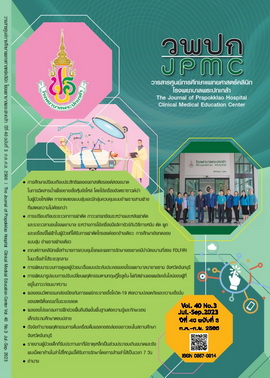Development of Behavior Modification Model Based on Solution-Focused Brief Theory via Line Application among People with Prediabetes
Main Article Content
Abstract
BACKGROUND: The number of people with prediabetes has steadily increased and advanced to diabetes onset, resulting in subsequent complications. According to statistics in 2020, Chanthaburi province had the highest number of prediabetic patients in the 6th Health Zone. Therefore, this group of patients should undergo appropriate behavioral changes to slow down the advancement of the disease.
OBJECTIVE: To develop and study the effects of the behavior modification model development based on Solution-Focused Brief Theory through the Line application among Prediabetic groups.
METHODS: This was participatory action research. The sample group consisted of 30 people with prediabetes in the jurisdiction of the Chanthanimit Sub-district Health Promoting Hospital. Content analysis, descriptive statistics, and the Paired-sample t-test analyzed data.
RESULTS: The development of the model consisted of four phases as follows: The first Phase: studying the current situation and analyzing behavioral modification problems of people with prediabetes in the Chanthanimit Health Promoting Hospital from a discussion with the hospital head, staff, five registered nurses, 10 volunteers, and 20 people with pre-diabetes. The second phase: developing a behavior modification model for people with pre-diabetes using the theoretical concept Solution-Focused Brief Theory. The third phase: implementing and monitoring a Behavior Modification Model through a Line Applications. And the fourth phase: evaluating the model's implementation and the behavior modification results. The research results showed that the average waist circumference, Mean Body Mass Index (BMI), and Blood Sugar after participating in the behavior modification were statistically significant reduced (p<0.001). Moreover, the sample had a statistically significant higher mean of health literacy and health behavior than before the experiment. (p<0.001).
CONCLUSION: The model, solution-focused behavior modification model, through line application, can be used as a guideline to increase the efficiency of behavior modification in people with pre-diabetes and people with diabetes to delay the diabetes onset and reduce complications.
Article Details

This work is licensed under a Creative Commons Attribution-NonCommercial-NoDerivatives 4.0 International License.
References
Kanchanapibulwong A, Khamwangsanga P, Kaewtha S. Reports on the situation of NCDs: diabetes, high blood pressure and related risk factors. Nonthaburi: Division of Non-Communicable Diseases, Department of Disease Control, Ministry of Public Health; 2019.
Health Information Center, Health Area 6. QOF63 01 Percentage of people who were screened and diagnosed with diabetes [Internet]. 2023 [cited 2022 Oct 2]. Available from: http://zone6.cbo.moph.go.th/phi/report/view/?repid-link=384&cat-link=122
Rongmuang D. Applying health promotion theories for behavioral modification to prevent and control obesity. J Prapokklao Hosp Clin Med Educat Center 2018; 35:77-91.
Nitirat P, Pisaipan P, Rongmuang D, Lekwong S. Effects of mixed-theory based model for behavioral modification on the perception toward self-efficacy in self-management and the reduction of chronic disease risks among professional and non professional staffs in Phrapokklao College of Nursing, Chanthaburi, Thailand. J Prapokklao Hosp Clin Med Educat Center 2018; 35:18-29.
Muangngern Y. Nursing guide behavior modification in adults with pre-diabetes type 2 diabetes. Bangkok: Outpatients screening work, nursing department Siriraj Hospital; 2019.
deShazer S, Dolan Y, Korman H, Trepper T, Mccollum E, Berg IK. More than Miracles: the state of the art of solution-focused brief therapy. 2nded. New York: Routledge; 2021.
Shuttlewood E, Nash J. A solution-focused approach to diabetes-related distress. Journal of Diabetes Nursing 2016; 20:102-7.
Prasertsong C. The applied solution-focused brief therapy in family nursing. Royal Thai Army Nursing Journal 2015; 16(2):1-7.
Ahmadi Z, Bazzazian S, Tajeri B, Rajab A. Effectiveness of solution-based therapy on self-compassion and reducing blood glucose in elderly patients with type 2 diabetes. Avicenna J Neuro Psycho Physiology 2020; 7:151-7.
VanVoorhis CR, Morgan BL. Understanding power and rules of thumb for determining sample sizes. Tutorials in Quantitative Methods for Psychology 2007; 3(2):43‐50.
Khunraksa S,Chadngern K. Development of a health behavior modification process for public health officer Bangpakong Hospital. Journal of NarathiwatRajanagarindra University 2021; 13(2):106-24
IntarakamhangU. Complete Report on Creating and Developing of Thailand Health Literacy Scales [internet]. [cited 2022 Sep 8], Nonthaburi: Division of Health Education, Department of Health Service Support, Ministry of Public Health;2017. Available from: http://bsris.swu.ac.th/upload/268335.pdf
Nutbeam D. Health literacy as a population strategy for health promotion. JJHEP 2017; 25(3):210-22.
Guyers M, Simm R, Bray D. Doing diabetes differently: An overview of solution-focused approaches in pediatric diabetes care. Diabetes Care for Children & Young People [Internet]. 2019 [cited 2022 Oct 2];9:39. Available from: https://diabetesonthenet.com/wp-content/uploads/pdf/dotna44613a248fca389857b818921b8f0ee.pdf
Greenwood DA, Ross TA, Reifsnider E. Applying a solution-focused approach to life with diabetes: insights gleaned via twitter. Diabetes Educ 2020; 46:485-94.
Valve P,Lehtinen-Jacks S, Eriksson T,Lehtinen M, Lindfors P, Saha MT, et al. LINDA-a solution-focused low-intensity intervention aimed at improving health behaviors of young females: a cluster-randomized controlled trial. BMC Public Health [Internet].2013[cited 2022 Oct 2]; 13:(1044). Available from: https://bmcpublichealth.biomedcentral.com/articles/10.1186/1471 2458-13-1044

